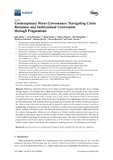Contemporary Water Governance: Navigating Crisis Response and Institutional Constraints through Pragmatism
Metadata
Show full item recordAuthor
Baird, Julia
Plummer, Ryan
Bullock, Ryan
Dupont, Diane
Heinmiller, Tim
Jollineau, Marilyne
Kubik, Wendee
Renzetti, Steven
Vasseur, Liette
Date
2016Doi
10.3390/w8060224Citation
Baird, J., R. Plummer, R. Bullock, D. Dupont, T. Heinmiller, M. Jollineau, W. Kubik, S. Renzetti, and L. Vasseur. "Contemporary water governance: Navigating crisis response and institutional constraints through pragmatism." Water 8(6) (2016): 224. DOI:10.3390/w8060224.
Abstract
Water has often been the source of crises and their frequency will intensify due to climate
change impacts. The Niagara River Watershed provides an ideal case to study water crises as it is an international transboundary system (Canada-United States) and has both historical and current challenges associated with water quantity and quality, which resonates broadly in water basins throughout the world. The aim of this study was to understand how stakeholders perceive ecosystems and the relationship with preferences for governance approaches in the context of water governance. An online survey instrument was employed to assess perceptions of the system in terms of resilience
(engineering, ecological, social-ecological, or epistemic), preferences for governance approaches (state, citizen, market, and hybrid forms), and the most pressing issues in the watershed. Responses showed that, despite demographic differences and adherence to different resilience perspectives, support was strongest for governance approaches that focused on state or state-citizen hybrid forms. The validity of the resilience typology as a grouping variable is discussed. The roles of institutional constraints, pragmatism in governance approach preferences, and the influence of multiple crises are explored in
relation to the context of the study site, as well as to water governance scholarship more broadly.

